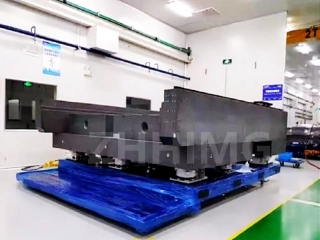In the precise world of semiconductor manufacturing, non-destructive testing of wafers is a key link to ensure the quality of chips. The seemingly insignificant granite base is actually the "unsung hero" that determines the detection accuracy. How on earth does it affect the test results? This article will conduct an in-depth analysis from dimensions such as material properties and structural design.
1. Stable Foundation: The natural advantages of granite lay a solid foundation for precision
1. Excellent seismic performance
During the operation of the wafer non-destructive testing equipment, the rotation of the motor and the movement of mechanical components will all generate vibrations. If these vibrations are not effectively suppressed, they will seriously interfere with the testing accuracy. The interior of granite is closely interwoven with mineral crystals such as quartz and feldspar. Its unique structure endows it with a natural vibration absorption capacity, capable of absorbing over 90% of the vibration energy of equipment. The actual measurement data of a certain semiconductor manufacturer shows that after using the granite base, the vibration amplitude of the detection equipment has been reduced from 12μm to 2μm, effectively avoiding the deviation of the detection signal caused by vibration.
2. Extremely low coefficient of thermal expansion
During the detection process, factors such as equipment heating and changes in environmental temperature will all affect the stability of the machine base. Ordinary materials expand significantly when heated, but the coefficient of thermal expansion of granite is only 1/5 of that of steel. Even if the ambient temperature fluctuates by 10℃, its deformation can be ignored. This enables the granite base to provide a stable reference platform for the inspection equipment, ensuring that the relative position between the inspection probe and the wafer remains accurate at all times and avoiding inspection errors caused by thermal deformation.
Second, precise design: Structural optimization further enhances the reliability of detection
High-precision processing and flatness guarantee
The high-quality granite base is processed by advanced five-axis linkage CNC technology, with a flatness of ±0.5μm/m, providing an ultra-flat installation reference for inspection equipment. In wafer inspection, the verticality and levelness of the inspection probe are crucial to the inspection results. A high-precision granite base can ensure the precise positioning of the probe, making the inspection data more accurate and reliable.
2. Customized structural adaptation
Granite machine bases can be customized for different wafer non-destructive testing equipment and process requirements. For example, to meet the requirements of optical inspection equipment for light reflection, the surface of the machine base can be specially treated; To meet the installation requirements of ultrasonic testing equipment, the base can be prefabricated with precise installation holes and cable trays, enabling rapid and accurate installation of the equipment and reducing detection deviations caused by installation errors.
Iii. Long-term stability: Reduce precision loss caused by equipment maintenance
Granite has high hardness and strong wear resistance, with a Mohs hardness of 6 to 7, which is three times the wear resistance of ordinary steel. During long-term inspection operations, the surface of the machine base is not prone to wear and can always maintain a good precision state. In contrast, the bases made of other materials may cause changes in the installation reference of the equipment due to wear and tear, thereby affecting the detection accuracy and requiring frequent calibration and maintenance. The long service life and high stability of the granite base effectively reduce the frequency of equipment maintenance and lower the risk of precision loss that may occur during the maintenance process.
From shock resistance, heat resistance to precise design, every feature of the granite base is safeguarding the accuracy of non-destructive testing of wafers. In today's semiconductor manufacturing era that pursues ultimate precision, choosing a high-quality granite base is like adding a solid layer of insurance to the accuracy and reliability of the test results.
Post time: Jun-18-2025

